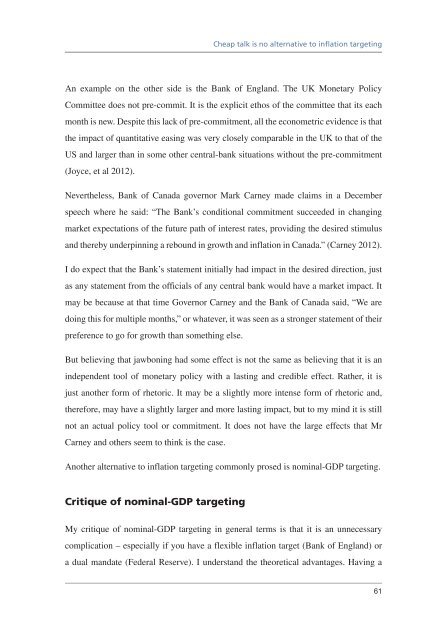Is inflation targeting dead? Central Banking After the Crisis - Vox
Is inflation targeting dead? Central Banking After the Crisis - Vox
Is inflation targeting dead? Central Banking After the Crisis - Vox
Create successful ePaper yourself
Turn your PDF publications into a flip-book with our unique Google optimized e-Paper software.
Cheap talk is no alternative to <strong>inflation</strong> <strong>targeting</strong>An example on <strong>the</strong> o<strong>the</strong>r side is <strong>the</strong> Bank of England. The UK Monetary PolicyCommittee does not pre-commit. It is <strong>the</strong> explicit ethos of <strong>the</strong> committee that its eachmonth is new. Despite this lack of pre-commitment, all <strong>the</strong> econometric evidence is that<strong>the</strong> impact of quantitative easing was very closely comparable in <strong>the</strong> UK to that of <strong>the</strong>US and larger than in some o<strong>the</strong>r central-bank situations without <strong>the</strong> pre-commitment(Joyce, et al 2012).Never<strong>the</strong>less, Bank of Canada governor Mark Carney made claims in a Decemberspeech where he said: “The Bank’s conditional commitment succeeded in changingmarket expectations of <strong>the</strong> future path of interest rates, providing <strong>the</strong> desired stimulusand <strong>the</strong>reby underpinning a rebound in growth and <strong>inflation</strong> in Canada.” (Carney 2012).I do expect that <strong>the</strong> Bank’s statement initially had impact in <strong>the</strong> desired direction, justas any statement from <strong>the</strong> officials of any central bank would have a market impact. Itmay be because at that time Governor Carney and <strong>the</strong> Bank of Canada said, “We aredoing this for multiple months,” or whatever, it was seen as a stronger statement of <strong>the</strong>irpreference to go for growth than something else.But believing that jawboning had some effect is not <strong>the</strong> same as believing that it is anindependent tool of monetary policy with a lasting and credible effect. Ra<strong>the</strong>r, it isjust ano<strong>the</strong>r form of rhetoric. It may be a slightly more intense form of rhetoric and,<strong>the</strong>refore, may have a slightly larger and more lasting impact, but to my mind it is stillnot an actual policy tool or commitment. It does not have <strong>the</strong> large effects that MrCarney and o<strong>the</strong>rs seem to think is <strong>the</strong> case.Ano<strong>the</strong>r alternative to <strong>inflation</strong> <strong>targeting</strong> commonly prosed is nominal-GDP <strong>targeting</strong>.Critique of nominal-GDP <strong>targeting</strong>My critique of nominal-GDP <strong>targeting</strong> in general terms is that it is an unnecessarycomplication – especially if you have a flexible <strong>inflation</strong> target (Bank of England) ora dual mandate (Federal Reserve). I understand <strong>the</strong> <strong>the</strong>oretical advantages. Having a61














